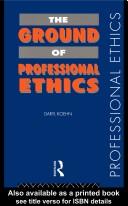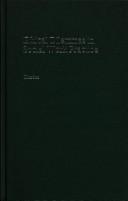| Listing 1 - 10 of 14 | << page >> |
Sort by
|
Book
ISBN: 3525016077 Year: 1972 Publisher: Göttingen Vandenhoeck und Ruprecht
Abstract | Keywords | Export | Availability | Bookmark
 Loading...
Loading...Choose an application
- Reference Manager
- EndNote
- RefWorks (Direct export to RefWorks)
Book
ISBN: 3932194128 Year: 1998 Publisher: Frankfurt am Main Gemeinschaftswerk der evangelischen Publizistik
Abstract | Keywords | Export | Availability | Bookmark
 Loading...
Loading...Choose an application
- Reference Manager
- EndNote
- RefWorks (Direct export to RefWorks)

ISBN: 0415116678 0203006615 9780203006610 9786610407897 6610407894 041511666X 9780415116664 9780415116671 9781134818433 1134818432 9781134818471 1134818475 9781134818488 1134818483 9781138150478 1138150479 9781138150478 1280407891 9781280407895 Year: 1994 Publisher: London Routledge
Abstract | Keywords | Export | Availability | Bookmark
 Loading...
Loading...Choose an application
- Reference Manager
- EndNote
- RefWorks (Direct export to RefWorks)
As each week beings more stories of doctors, lawyers and other professionals abusing their powers, while clients demand extra services as at a time of shrinking resources; it is imperative that all practising professionals have an understanding of professional ethics.In The Ground of Profesional Ethics, Daryl Koehn discusses the practical issues in depth, such as the level of service clients can justifiably expect from professionals, when service to a client may be legitimately terminated and circumstances in which client confidences can be broken. She argues that, while clien
Professional ethics. --- 241.66*1 --- #GBIB:Overlegcentrum Christelijke Ethiek --- Theologische ethiek: beroepsethiek; zakenmoraal --- 241.66*1 Theologische ethiek: beroepsethiek; zakenmoraal --- Professional ethics --- Codes of ethics --- Codes of professional ethics --- Ethical codes --- Professional responsibility --- Professions --- Ethics --- Moral and ethical aspects

ISBN: 0710207557 Year: 1986 Publisher: Boston (Mass.) : Routledge and Kegan Paul,
Abstract | Keywords | Export | Availability | Bookmark
 Loading...
Loading...Choose an application
- Reference Manager
- EndNote
- RefWorks (Direct export to RefWorks)
241.66*1 --- Social case work --- -Social service --- -Social workers --- -Human services personnel --- Benevolent institutions --- Philanthropy --- Relief stations (for the poor) --- Social service agencies --- Social welfare --- Social work --- Human services --- Case work, Social --- Casework, Social --- Social casework --- Social service --- Counseling --- Friendly visiting --- Interviewing --- Theologische ethiek: beroepsethiek; zakenmoraal --- Moral and ethical aspects --- Professional ethics --- Social workers --- Moral and ethical aspects. --- Professional ethics. --- -Theologische ethiek: beroepsethiek; zakenmoraal --- 241.66*1 Theologische ethiek: beroepsethiek; zakenmoraal --- -241.66*1 Theologische ethiek: beroepsethiek; zakenmoraal
Book
ISBN: 9781107513471 9781107105591 1107105595 1107513472 9781316226391 1316355500 1316349500 1316226395 Year: 2015 Publisher: New York, NY: Cambridge university press,
Abstract | Keywords | Export | Availability | Bookmark
 Loading...
Loading...Choose an application
- Reference Manager
- EndNote
- RefWorks (Direct export to RefWorks)
Terrorism, cyberbullying, child pornography, hate speech, cybercrime: along with unprecedented advancements in productivity and engagement, the Internet has ushered in a space for violent, hateful, and antisocial behavior. How do we, as individuals and as a society, protect against dangerous expressions online? Confronting the Internet's Dark Side is the first book on social responsibility on the Internet. It aims to strike a balance between the free speech principle and the responsibilities of the individual, corporation, state, and the international community. This book brings a global perspective to the analysis of some of the most troubling uses of the Internet. It urges net users, ISPs, and liberal democracies to weigh freedom and security, finding the golden mean between unlimited license and moral responsibility. This judgment is necessary to uphold the very liberal democratic values that gave rise to the Internet and that are threatened by an unbridled use of technology.
Computer. Automation --- Philosophy and psychology of culture --- General ethics --- Internet governance --- Internet --- Moral and ethical aspects --- History --- Internet governance. --- 241.66*2 --- 172 --- Governance, Internet --- Moral and ethical aspects. --- History. --- Theologische ethiek: informatie; media --- Sociale ethiek. Sociale moraal. Sociale verantwoordelijkheid --- Management --- 241.66*2 Theologische ethiek: informatie; media --- 172 Sociale ethiek. Sociale moraal. Sociale verantwoordelijkheid --- Internet - Moral and ethical aspects --- Internet - History
Book
ISBN: 9026301286 Year: 1970 Publisher: Bilthoven Ambo
Abstract | Keywords | Export | Availability | Bookmark
 Loading...
Loading...Choose an application
- Reference Manager
- EndNote
- RefWorks (Direct export to RefWorks)
ethiek --- Advertising. Public relations --- commercials --- ethics [philosophy] --- Social ethics --- reclame --- psychology --- psychologie --- 241.66*1 --- 177 --- #GROL:SEMI-174 --- #GROL:SEMI-316:33 --- C3 --- materialisme --- consumptie --- Theologische ethiek: beroepsethiek; zakenmoraal --- Ethiek en maatschappelijk verkeer --- Kunst en cultuur --- 177 Ethiek en maatschappelijk verkeer --- 241.66*1 Theologische ethiek: beroepsethiek; zakenmoraal --- commercials [oral or performed works] --- 360 --- pers en communicatie --- presse et communication
Book
ISBN: 9789042035546 9789401208284 940120828X 9042035544 9786613922588 1283610132 Year: 2012 Volume: v. 46 Publisher: Amsterdam New York Rodopi
Abstract | Keywords | Export | Availability | Bookmark
 Loading...
Loading...Choose an application
- Reference Manager
- EndNote
- RefWorks (Direct export to RefWorks)
In today’s world, the boundaries within which Christian theologians operate are becoming ever more permeable, and Christian theology is increasingly influenced and challenged by multiple “outside” factors. In Western Europe, two such factors stand out in particular: the so-called “turn to religion” in continental philosophy and religious diversity. Theologians working with contemporary continental philosophers and theologians engaging the multireligious world tend to work quite separately from one another. The aim of the present book is therefore to initiate a conversation between these two groups of theologians. The question of truth was chosen because it is both a key issue in contemporary-philosophical debates (in the continental and analytic traditions) and one that arises in complex and problematic ways in the praxis of, and theoretical reflection on, interreligious dialogue. Some of the pressing questions that are addressed by the contributors to this volume are: What is truth? What is theological truth? How does the issue of truth arise from interreligious encounter? To what extent can or should the nature of truth be discussed explicitly during interreligious dialogue? Or should the question of truth be rather postponed in the interest of successful interreligious encounter? Is there a hermeneutical concept of truth and, if so, how can it be of help for theological reflection on the question of truth and on the role and place of truth in the context of dialogue between religions?
21*01 --- 241.66 --- 291.1 --- 241.66 Theologische ethiek: waarheid en leugen --- Theologische ethiek: waarheid en leugen --- 21*01 Godsdienstfilosofie: christelijke religie: filosofisch en rationeel --- Godsdienstfilosofie: christelijke religie: filosofisch en rationeel --- 291.1 Godsdienstfilosofie --- Godsdienstfilosofie --- Truth --- Conviction --- Belief and doubt --- Philosophy --- Skepticism --- Certainty --- Necessity (Philosophy) --- Pragmatism --- Religious aspects --- Religious aspects. --- Philosophical theology. --- Philosophy.
Book
ISBN: 9781107447745 9781107061095 9781107685680 1107061091 1107685680 1139862561 1139699490 1107447747 1139871277 1139863428 1139865552 1139861263 1139869159 9781139865555 9781139871273 9781139699495 9781139862561 9781139861267 9781139863421 9781139869157 Year: 2014 Publisher: Cambridge : Cambridge University Press,
Abstract | Keywords | Export | Availability | Bookmark
 Loading...
Loading...Choose an application
- Reference Manager
- EndNote
- RefWorks (Direct export to RefWorks)
This book defends the controversial 'absolute view' of lying, which maintains that an assertion contrary to the speaker's mind is always wrong, regardless of the speaker's intentions. Whereas most people believe that a lie told for a good cause, such as protecting Jews from discovery by Nazis, is morally acceptable, Christopher Tollefsen argues that Christians should support the absolute view. He looks back to the writings of Augustine and Aquinas to illustrate that lying violates the basic human goods of integrity and sociality and severely compromises the values of religion and truth. He critiques the comparatively permissive views espoused by Cassian, Bonhoeffer, and Niebuhr and argues that lies often jeopardize the good causes for which they are told. Beyond framing a moral absolute against lying, this book explores the questions of to whom we owe the truth and when, and what steps we may take when we should not give it.
Truthfulness and falsehood --- Christian ethics --- 241.66 --- 241.66 Theologische ethiek: waarheid en leugen --- Theologische ethiek: waarheid en leugen --- Believability --- Credibility --- Falsehood --- Lying --- Post-truth --- Untruthfulness --- Reliability --- Truth --- Honesty --- Ethical theology --- Moral theology --- Theology, Ethical --- Theology, Moral --- Christian life --- Christian philosophy --- Religious ethics --- Religious aspects&delete& --- Christianity --- Religious aspects --- Christian ethics. --- Truthfulness and falsehood. --- Christianity.
Book
ISBN: 9783110202748 3110202743 9786612187544 1282187546 3110217376 Year: 2009 Volume: 23 Publisher: Berlin ; New York Walter de Gruyter
Abstract | Keywords | Export | Availability | Bookmark
 Loading...
Loading...Choose an application
- Reference Manager
- EndNote
- RefWorks (Direct export to RefWorks)
Das Thema Laster im Mittelalter zeichnet sich durch seine Kontinuität über das gesamte Mittelalter aus und hat seine Wurzeln in der Spätantike und seine Nachwirkungen in der Neuzeit. Es berührt fast alle Bereiche mittelalterlicher Kultur und hat eine unerschöpfliche Literatur hervorgebracht. Der Sammelband beruht auf den Ergebnissen des Freiburger Kolloquiums 2006, das sich erstmals mit der langen Tradition der sieben Todsünden und den mittelalterlichen Lasterkatalogen befasste, und vereint die Beiträge namhafter Wissenschaftlerinnen und Wissenschaftler unterschiedlicher Fachrichtungen. Laster wurden im Mittelalter systematisch geordnet: Sie wurden in Hauptlaster eingeteilt, aus denen andere Laster hervorgingen, als Sünden verstanden und dienten darüber hinaus ganz allgemein der Beschreibung menschlicher Leidenschaften und Handlungen. Aus historischer, literaturwissenschaftlicher, theologischer, philosophischer, kunst- und rechtshistorischer Perspektive entwerfen die neun Beiträge in deutscher, englischer und französischer Sprache ein lebendiges Bild der Wünsche und Ängste des mittelalterlichen Menschen, aber auch des gesellschaftlichen Lebens im Mittelalter.
Vices. --- Civilization, Medieval. --- Vices --- Civilisation médiévale --- Deadly sins --- -241.66 --- Capital sins --- Seven capital sins --- Seven deadly sins --- Sins, Capital --- Sins, Deadly --- Sins --- Sin, Mortal --- History of doctrines --- -Theologische ethiek: waarheid en leugen --- 241.66 Theologische ethiek: waarheid en leugen --- Theologische ethiek: waarheid en leugen --- Civilisation médiévale --- Theology --- Civilization, Medieval --- Religion --- Philosophy & Religion --- Christianity --- History --- Vice --- Middle Ages (Cultural and Intellectual Life). --- -History of doctrines --- -Vices. --- -Deadly sins
Book
ISBN: 019505850X 9780195058505 Year: 1907 Publisher: New York (N.Y.) : Oxford university press,
Abstract | Keywords | Export | Availability | Bookmark
 Loading...
Loading...Choose an application
- Reference Manager
- EndNote
- RefWorks (Direct export to RefWorks)
Computer security. --- Computers and civilization. --- Human-computer interaction. --- 241.66*2 --- Theologische ethiek: informatie; media --- 241.66*2 Theologische ethiek: informatie; media --- Computers and civilization --- Computer security --- Human-computer interaction --- #GBIB:CBMER --- #GBIB:Overlegcentrum Christelijke Ethiek --- Computer-human interaction --- Human factors in computing systems --- Interaction, Human-computer --- Human engineering --- User-centered system design --- User interfaces (Computer systems) --- Civilization and computers --- Civilization --- Computer privacy --- Computer system security --- Computer systems --- Computers --- Cyber security --- Cybersecurity --- Electronic digital computers --- Protection of computer systems --- Security of computer systems --- Data protection --- Security systems --- Hacking --- Protection --- Security measures
| Listing 1 - 10 of 14 | << page >> |
Sort by
|

 Search
Search Feedback
Feedback About UniCat
About UniCat  Help
Help News
News